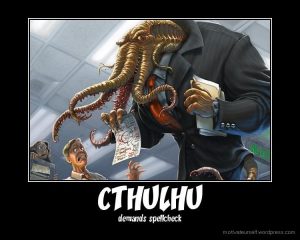Word Up!
2 Minutes Read Time
 Nicola Mason: An obvious blog post presented itself to me this week, courtesy of two lovely Facebook friends. Friend One reported with delight that he had finally used the word “Cthulhu” in a poem. Friend Two linked to Grammarly’s “Tips for Writing Better.”
Nicola Mason: An obvious blog post presented itself to me this week, courtesy of two lovely Facebook friends. Friend One reported with delight that he had finally used the word “Cthulhu” in a poem. Friend Two linked to Grammarly’s “Tips for Writing Better.”
Friend One’s status I immediately liked. (I mean, how cool is “Cthulhu”?) On Friend Two’s, I commented: “I object to [Tip] number 6,” which reads, “Never use a big word when a diminutive alternative would suffice.”
Because: Why limit yourself to “diminutive alternatives” when there’s so much big, beautiful verbiage out there? Polysyllabic words, obscure words, and odd, striking usages of familiar words lend both heft and luster to the language. Not to mention flexibility. (Who doesn’t want options when it comes to conveying something that means . . . well, something. Nuance is all!) Perhaps most important, rare words can increase not just our knowledge (raise your hand if you’re about to google Cthulhu!) but our ways of thinking, of linking ideas. Moreover, they’re just plain sources of delight—at least for the CR staff.
I therefore offer you some words in our current issue that surprised, delighted, and confounded us. (Yes, we had to look up some of them—and it was fun.)
parterre biliopancreatic
embouchure oneiric
kachinas ideogram
abortifacients tisanes
scanted polyhedrality
ductile glockenspiel
chummery nanometer
palisades lorries
bulbous transmutation
debauched hauliers
bladderwrack gelatinous
klobbyosh koan
fabaceous sarangousty
glassine flexion
denouement
